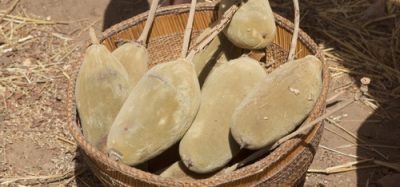A few things to consider over your next cup of coffee
- Like
- Digg
- Del
- Tumblr
- VKontakte
- Buffer
- Love This
- Odnoklassniki
- Meneame
- Blogger
- Amazon
- Yahoo Mail
- Gmail
- AOL
- Newsvine
- HackerNews
- Evernote
- MySpace
- Mail.ru
- Viadeo
- Line
- Comments
- Yummly
- SMS
- Viber
- Telegram
- Subscribe
- Skype
- Facebook Messenger
- Kakao
- LiveJournal
- Yammer
- Edgar
- Fintel
- Mix
- Instapaper
- Copy Link
Posted: 6 March 2024 | Professor Chris Elliott | No comments yet
Professor Chris Elliott ruminates on the part his morning coffee plays global GHG emissions and asks how we can work with this huge sector to become more sustainable.


It’s hard for me to imagine now starting a day without a freshly brewed cup of coffee. And for various reasons coffee has come onto my radar screen over the past few months.
The first really important item for attention is the link between the growing and drying of coffee beans and deforestation. A number of important areas of the world that have been linked to rainforest destruction are within what’s known as the ‘Coffee Bean Belt’.
There is very strict deforestation legislation in place now in the EU (and similar laws promised for the UK) in terms of making it illegal for companies to buy or sell a range of food and beverage commodities and related products, including coffee. The European coffee industry is reeling from the potential impact, claiming it could destroy the livelihood of millions of smallholder producers who can not provide the traceability data now demanded. This is not the first time (or likely last) that a massive conflict between environmentally sustainable production and economic sustainability, especially for smallholders, has become apparent to me. This is something that really needs to be considered, understood and become part of the overall net zero strategy.
Another important aspect to this topic is the contribution of coffee production and consumption and GHG emissions. We hear a lot (too much in my opinion) about meat and methane, but much less about some of the large plant-based crops in the world and their impact on climate change (including coffee). It is not surprising that the large coffeehouse chains are putting a lot of attention into having both environmentally and economically sustainable supply chains going forward.
And now for some statistics that really surprised me when I started to look into the aspect of coffee waste. Coffee is traded in 60kg bags globally and approximately 180 million of these are sold each year. From this a staggering 60 million tonnes of spent coffee grounds are generated. This massive level of waste is one of the major contributing factors of GHGs in coffee and again something that has become a priority for a number of forward-thinking coffeehouse chains to try and address.
This is another example where a great deal of thinking about ‘circular economy solutions’ is occurring and there are a myriad of projects going on in different parts of the world trying to turn coffee waste into value streams. These range from brick and fertiliser production to making paper and fibre products and many more. There is a very interesting UK based start-up called Revive, which is working on extracting oil from coffee grounds to be used to replace other forms of plant-based oils such as palm oil, which are themselves environmentally challenging to produce.
But with all of these great potential solutions comes the hugely difficult issue of logistics. Collecting waste coffee grounds in a way that is economically viable and also does not cause further environmental issues is difficult. As just one example, diesel emissions from vehicles used to collect the waste and take them to various processing plants must be considered.
There is another very interesting article which carried out some life cycle assessments and shows just how tricky this problem will be to overcome.
So, while you think about that next cup of aromatic and great tasting coffee give a little thought to one of the world’s most traded beverages. The massive conflict of keeping millions of smallholders from poverty, yet ensuring (like all other types of food and beverages we consume) it is environmentally sustainable is far from a quick fix.
Related topics
Environment, Food Waste, Plant based, Research & development, Sustainability, Trade & Economy









